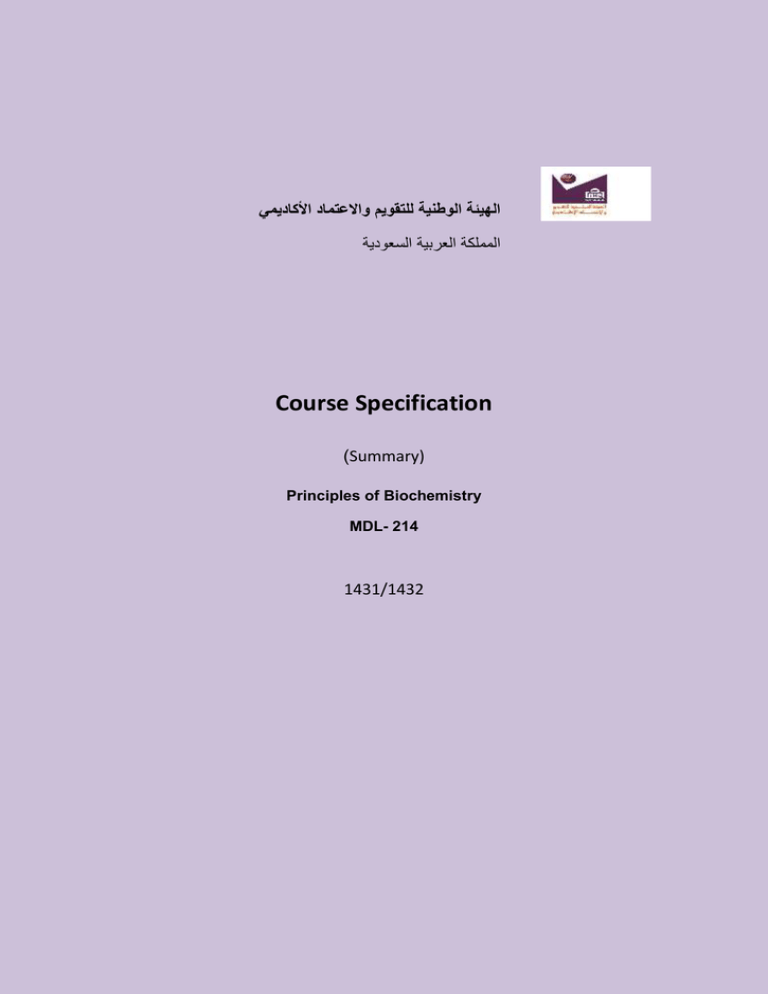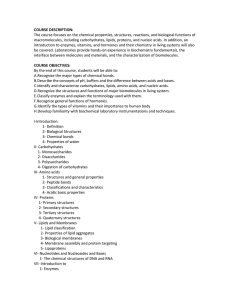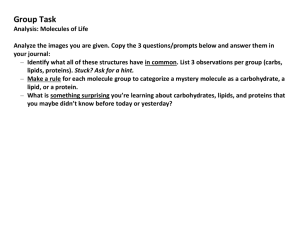
الهيئة الوطنية للتقويم واالعتماد األكاديمي
المملكة العربية السعودية
Course Specification
))Summary
Principles of Biochemistry
MDL- 214
1431/1432
Course Specification
Institution: Majmaa university
College/Department: College of Science in Zulfi – Medical Laboratories department
A- Course Identification and General Information:
1. Course title and code:
2. Credit hours:
MDL-214
3 (2 +1)
4. Name of faculty member responsible for the course: Dr. Ahmed Khamis Salama
5. Level/year at which this course is offered:
3rd level
6. Co-requisites for this course (if any): CHEM-109
7. Location if not on main campus: College of Science in Zulfi
B- Objectives
1. Summary of the main learning outcomes for students enrolled in the course.
Studying the chemical compositions and the biological functions of the main
biochemical molecules including carbohydrates, proteins, lipids and their
components, enzymes and different types of hormones. It also includes methods of
practical qualitative and quantitative assays to discover these molecules.
By the end of this course, student should be able to:
- Know and classify the different groups of carbohydrates and their main biological
significance.
- Know and classify the main lipids and describe their chemical structures and
biological significance.
- Know amino acids, their classification, physical and chemical properties as well as
describing their chemical structures, their main biological significance.
- Know proteins, their structures and physical and chemical forces affecting their
structure with brief reference to some common proteins, e.g., haemoglobin,
hormones e.g. insulin and immunoglobulin e.g. IgG
- Describe enzymes and their role in the biological reactions.
- Know the structure of nucleic acids and their role in protein biosynthesis.
C- Course Description (Note: General description in the form to be used for the Bulletin or
Handbook should be attached)
1. Topics to be Covered
List of Topics
No of
Weeks
Contact
hours
5
15
3
9
3
9
- Chemistry and biological functions of nucleic acids
1
3
- Chemistry and biological functions of vitamins and minerals
1
3
- Chemistry and biological functions of hormones
1
3
- Chemistry and biological functions of carbohydrates
- Chemistry and biological functions of proteins
- Chemistry and biological functions of lipids
2. Course components (total contact hours per semester):
Lecture: 28
Tutorial:
Laboratory: 28 Practical/Field
work/Internship
Other:
3. Additional private study/learning hours expected for students per week. (This
should be an average :for the semester not a specific requirement in each week) : 10
hrs through visiting specific websites for biochemistry to answer some questions
related to the course topics.
4. Schedule of Assessment Tasks for Students During the Semester
degree
week
assessment
degree
Week
Assessment
20
15
Practical exam
15
6
1st midterm exam
50
16
Final exam
15
12
2nd midterm exam
D- E Learning Resources.
Required Text(s):
Lectures and the hand out
2. Essential References
- Biochemistry.( 1999): Matthews, C. E.; K. E. Van Holde; K. G. Ahern, 3rd edition.
Benjamin Cummings. ISBN 0-8053-3066-6
- Lehninger's Principles of Biochemistry (2005): Nelson DL, Cox MM.., 4th Edition. W.
H. Freeman and Company, New York.
3- Recommended Books and Reference Material (Journals, Reports, etc) (Attach List)
- Gutteridge A, Thornton JM. (2005). "Understanding nature's catalytic toolkit".
Trends in Biochemical Sciences 30 (11): 622–29. doi:10.1016/j.tibs.2005.09.006. PMID
16214343
- Biology: Exploring Life. (2006): Campbell, Neil A.; Brad Williamson; Robin J. Heyden .
Boston, Massachusetts: Pearson Prentice Hall. ISBN 0-13-250882-6.
http://www.phschool.com/el_marketing.html.
- Evolution of carbohydrate metabolic pathways (1996): Romano A, Conway T . Res
Microbiol 147 (6–7): 448–55. doi:10.1016/0923-2508(96)83998-2. PMID 9084754.
4-.Electronic Materials, Web Sites
http://en.wikipedia.org/wiki/Biochemistry
http://en.wikipedia.org/wiki/Proteins
http://en.wikipedia.org/wiki/Carbohydrates
http://en.wikipedia.org/wiki/Lipids
5- Other learning material such as computer-based programs/CD, professional standards/regulations
E- Assessment
- Mid-Term exams and practical exam
- Final Exam
50%
50%



